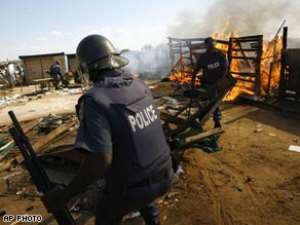
More than 40 people have been killed and 28,000 made homeless in anti-immigrant violence that has rocked the nation during the past week, authorities say.
Hundreds of people were also arrested as burning, looting and violence flared in townships in the city's poorest areas.
The country has also seen a disturbing throwback to the 1980s apartheid-era lynching tactic of "necklacing," which was widely used in the townships at the time.
Used on suspected informants, the "necklace" is a car tire, filled with petrol, put around the person's neck and set alight.
South Africa's army has been patrolling riot-hit townships to restore calm as the country counts the cost of the xenophobic attacks.
The army was drafted in to control the worst-affected areas and no new outbreaks of violence was reported Thursday.
Around 400 people have been arrested for crimes including murder, damage to property and causing a public disturbance.
The victims are mainly immigrants and refugees from other parts of Africa, including Zimbabwe, where a devastated economy has sent at least two million people across the border in search of a better life.
Some say the attacks stem from a long-standing feeling among locals that the number of immigrants in South Africa results in shortages of jobs and essential needs.
Inadequate housing, a lack of running water and electricity, the rising prices of food, and escalating crime -- nearly 20,000 people were slain in South Africa last year -- add to the resentment.
South African President Thabo Mbeki approved the deployment of the army Wednesday to help stop the attacks, which have drawn condemnation from South African officials and other African leaders.
Brigadier General Kwena Mangope of the South African Department of Defense said troops were assisting the South African Police Service, the national police.
"We are in a supporting role," Mangope said. "We are not taking over the operation."
He said the army was providing troops and equipment, such as helicopters and tents.
The deployment of the military and the continued operations of the police service helped quell the violence, Malaudzi said.
Community groups, churches, and communication between police and affected communities also helped the situation, he said.
"The message is going out there to say we condemn this kind of action, and (to) those that are involved in instigating this violence, the law is going to come down on them very, very seriously," Malaudzi said.
According to South Africa's latest census, the country has about 45 million people.
The South African Department of Human Affairs estimates that more than 4 million people reside in South Africa illegally, but that figure is based on a 10-year-old study and some feel the number of immigrants in South Africa is much higher.
Some say that millions have recently fled to South Africa from Zimbabwe because of violence there since the county's stalled election.
A presidential run-off between long-time leader President Robert Mugabe and his opposition challenger, Morgan Tsvangirai, is scheduled for June 27 in Zimbabwe -- three months after the initial vote.




 Ejisu by-election: Anger is bound to occur but return to your 'sweet home' — Nan...
Ejisu by-election: Anger is bound to occur but return to your 'sweet home' — Nan...
 Limited voters registration: Don't allow politicians to engage your minors for p...
Limited voters registration: Don't allow politicians to engage your minors for p...
 Ferry on Oti River breaks down; drivers and passengers stranded
Ferry on Oti River breaks down; drivers and passengers stranded
 AstraZeneca covid-19 vaccine is not administered in Ghana anymore - GHS
AstraZeneca covid-19 vaccine is not administered in Ghana anymore - GHS
 ‘You’re respectful, intelligent and decent’ – Dormaahene eulogises Bawumia
‘You’re respectful, intelligent and decent’ – Dormaahene eulogises Bawumia
 Limited voter registration crisis: EC directs district officers to switch to off...
Limited voter registration crisis: EC directs district officers to switch to off...
 Presidency declines MFWA’s request for full KPMG report on SML/GRA deal
Presidency declines MFWA’s request for full KPMG report on SML/GRA deal
 KPMG report on SML/GRA deal exempt from public disclosure — Presidency refuses M...
KPMG report on SML/GRA deal exempt from public disclosure — Presidency refuses M...
 ‘We’re digitizing our system; payment to temporary staff will no longer be delay...
‘We’re digitizing our system; payment to temporary staff will no longer be delay...
 We’ve not announced Societe Generale’s exit from Ghana – MD debunk reports
We’ve not announced Societe Generale’s exit from Ghana – MD debunk reports
